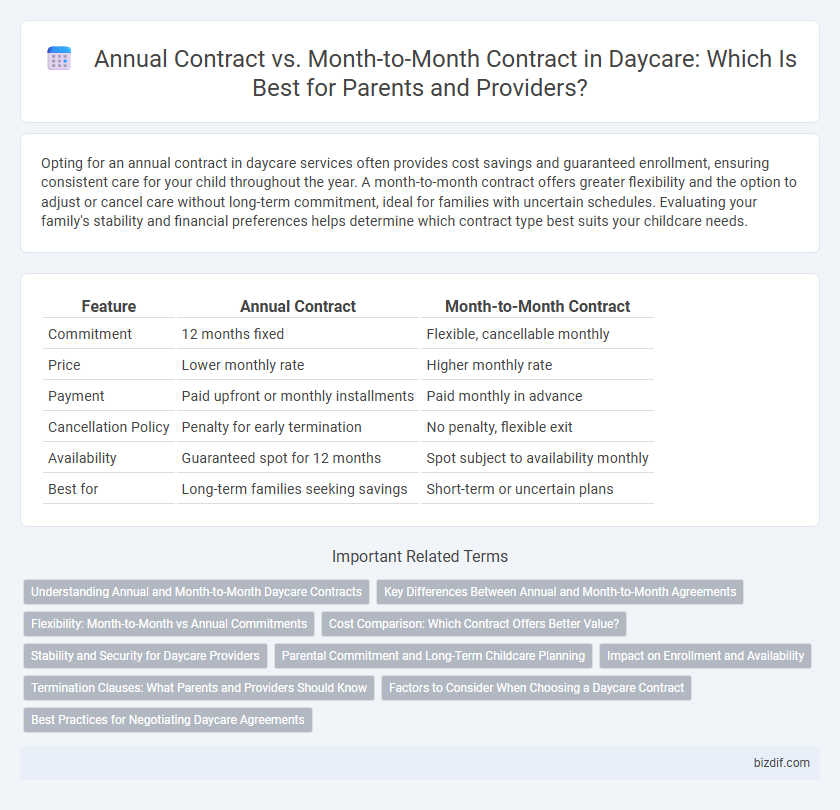Opting for an annual contract in daycare services often provides cost savings and guaranteed enrollment, ensuring consistent care for your child throughout the year. A month-to-month contract offers greater flexibility and the option to adjust or cancel care without long-term commitment, ideal for families with uncertain schedules. Evaluating your family's stability and financial preferences helps determine which contract type best suits your childcare needs.
Table of Comparison
| Feature | Annual Contract | Month-to-Month Contract |
|---|---|---|
| Commitment | 12 months fixed | Flexible, cancellable monthly |
| Price | Lower monthly rate | Higher monthly rate |
| Payment | Paid upfront or monthly installments | Paid monthly in advance |
| Cancellation Policy | Penalty for early termination | No penalty, flexible exit |
| Availability | Guaranteed spot for 12 months | Spot subject to availability monthly |
| Best for | Long-term families seeking savings | Short-term or uncertain plans |
Understanding Annual and Month-to-Month Daycare Contracts
Annual daycare contracts provide families with a fixed rate and guaranteed enrollment for the entire year, offering stability and potential discounts compared to monthly plans. Month-to-month daycare contracts offer greater flexibility, allowing parents to adjust or cancel care with shorter notice, often at a higher per-month cost. Understanding the terms of each contract helps parents balance budget, commitment level, and childcare needs effectively.
Key Differences Between Annual and Month-to-Month Agreements
Annual daycare contracts typically require a fixed commitment for 12 months, offering stability and often a lower monthly rate, whereas month-to-month agreements provide greater flexibility without long-term obligation but usually at a higher cost. With annual contracts, parents secure a consistent spot for their child and predictable budgeting, while month-to-month contracts allow adjustments based on changing childcare needs. Termination policies differ significantly; annual contracts may include penalties for early withdrawal, whereas month-to-month agreements usually offer easier cancellation with shorter notice periods.
Flexibility: Month-to-Month vs Annual Commitments
Month-to-month daycare contracts offer unparalleled flexibility, allowing parents to adjust enrollment based on changing schedules or financial situations without long-term obligations. Annual contracts require a fixed commitment, providing rate stability and guaranteed placement but limiting the ability to make sudden changes. Choosing between these options depends on the family's need for adaptability versus the advantage of consistent availability and pricing.
Cost Comparison: Which Contract Offers Better Value?
Annual contracts for daycare often provide a more cost-effective option, with lower monthly rates and potential discounts compared to month-to-month agreements. Month-to-month contracts offer greater flexibility but usually come at a premium price, reflecting the convenience of short-term commitments. Families seeking long-term consistency can save significantly by committing to an annual contract, reducing overall childcare expenses.
Stability and Security for Daycare Providers
Annual contracts offer daycare providers greater stability and financial security by guaranteeing enrollment and consistent income throughout the year. Month-to-month contracts provide flexibility but can lead to unpredictable attendance and revenue fluctuations, challenging long-term planning. Securing annual contracts helps providers invest confidently in quality staff and resources, ensuring sustained care standards.
Parental Commitment and Long-Term Childcare Planning
Annual contracts in daycare require a stronger parental commitment, ensuring consistent enrollment and stable care over a fixed period, which supports long-term childcare planning and developmental continuity for the child. Month-to-month contracts offer flexibility for parents with uncertain schedules or changing needs but may result in less predictability for the daycare and potential disruptions in the child's routine. Choosing between these contracts balances the need for parental commitment and stability against adaptability in childcare arrangements.
Impact on Enrollment and Availability
Annual contracts in daycare settings typically secure enrollment and guarantee availability for the entire year, providing stability for both parents and providers. Month-to-month contracts offer flexibility but can lead to fluctuating availability, making long-term enrollment less predictable. This variability may result in frequent openings and closures, affecting overall capacity management and resource planning in daycare centers.
Termination Clauses: What Parents and Providers Should Know
Termination clauses in annual contracts for daycare typically require parents to provide a 30 to 60-day written notice to avoid penalties, ensuring financial commitment from both parties. Month-to-month contracts offer flexible termination but often include a shorter notice period, commonly 14 to 30 days, allowing parents to adjust childcare needs without long-term obligations. Providers should clearly outline these terms to prevent disputes, while parents must understand the financial and notice requirements tied to each contract type.
Factors to Consider When Choosing a Daycare Contract
Parents selecting a daycare contract must evaluate factors such as financial commitment, flexibility, and child's routine stability. Annual contracts often provide cost savings and guaranteed enrollment but require upfront commitment, whereas month-to-month agreements offer adaptability at a potentially higher monthly rate. Understanding the family's budget constraints, anticipated schedule changes, and preference for consistent childcare hours are essential in making an informed decision.
Best Practices for Negotiating Daycare Agreements
Negotiating daycare agreements requires clarity on terms such as Annual Contracts and Month-to-Month Contracts, balancing commitment with flexibility. Best practices include thoroughly reviewing fee structures, cancellation policies, and service inclusions to avoid hidden costs or penalties. Parents should prioritize transparent communication with providers and request written agreements detailing schedules, fees, and provisions for changes or disputes.
Annual Contract vs Month-to-Month Contract Infographic

 bizdif.com
bizdif.com